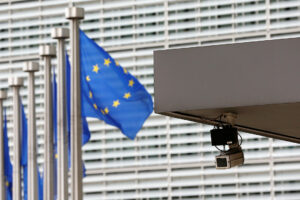
EU leaders agree targeted, temporary support for green industry
BRUSSELS – European Union leaders agreed on Friday they should allow “targeted, temporary and proportionate” support to ensure Europe’s future as a manufacturing base for green tech products and counter US and Chinese competition.
The European Commission has proposed loosening rules on state aid for investments in renewable energy, decarbonizing industry, hydrogen or zero-emission vehicles, partly in response to the U.S. Inflation Reduction Act (IRA).
EU leaders have expressed concern that local content requirements of much of the $369 billion of subsidies in the IRA have will encourage companies to abandon Europe for the United States.
German Chancellor Olaf Scholz said he was confident that talks between the transatlantic partners could limit discrimination against companies based in Europe.
“When we are looking at our competitiveness, we need to do our own homework and do everything to ensure that we do not have an international subsidy race,” he told a news conference at the end of the leaders’ summit in Brussels.
The International Energy Agency estimates the global market for mass-produced clean energy technologies will triple to $650 billion a year by 2030.
Europe wants a piece of the action, but sectors from solar panels to wind turbine blades and vehicle batteries are dominated by China, with well over 50% of the market.
The Commission is set to propose a Net-Zero Industry Act to speed up permits for green projects and a Critical Raw Materials Act to boost recycling and diversify sourcing to be less reliant on Chinese processors.
Commission President Ursula von der Leyen said they would be presented before the next time EU leaders meet on March 22-23.
Funding is proving the most controversial element of the plan.
There is widespread resistance to joint borrowing and some concern that looser state aid rules would unsettle the EU internal market because subsidies in the two largest economies, Germany and France, would dwarf offerings elsewhere.
Countries such as the Netherlands, Ireland, the Czechs and the Nordics have expressed concern this could lead to excessive non-targeted subsidies and say work to improve the EU single market would be more effective. — Reuters
